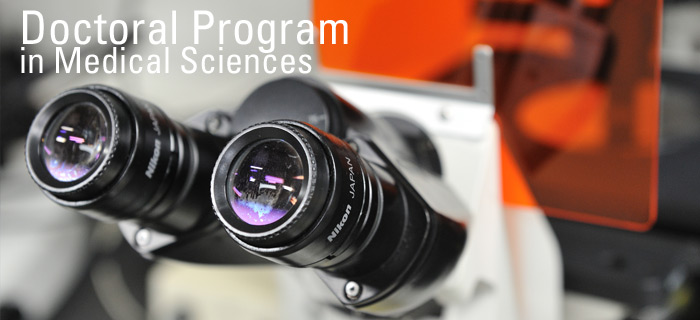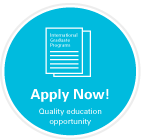PROGRAMS

Introduction
The Doctoral Program in Medical Sciences of University of Tsukuba will cultivate in our scholars a spirit of creativity and cooperation so that they can become innovative and leading biomedical researchers and educators. Through the program, we will advance knowledge and problem solving skills through rigorous scientific debate conducted always in a spirit of mutual and abiding respect.
Research fields in our program covers basic experimental medicine as well as social and environmental medicine: Biochemistry, Molecular Biology, Cell Biology, Human Genetics, Physiology, Animal Models, Anatomy and Embryology, Pathology, Pharmacology, Oncology, Infection Biology, Immunology, Epidemiology, Environmental Medicine, Legal Medicine, and Public Health. Students can select their specialties from 18 different fields. The program is designed to have large faculty members so that students can learn each subject from the specialists in the field. More than 70 members participate in the program.
Another characteristic of our program is the emphasis on rigorous scientific debates. Students are expected to participate in rigorous discussion during the seminars and periodical meetings in order to sharpen their communication skills and creative thinking. They are expected to be able to judge and evaluate the objectives, methods, results and significance of research to understand the scientific and logistic behind the research work. Organization and preparation for publication and thesis is also important. While working toward their thesis, students gain advice from their mentor as well as from faculty and students outside their own laboratory. The entire faculty members are willing to support and contribute to the quality of thesis.
There are three doctoral programs offered by the University of Tsukuba Graduate School of Medical Sciences.
Global 30 International Doctoral Program: The University of Tsukuba aims to cultivate human resources with a global view by promoting international exchange to improve academic standards. The University of Tsukuba has been selected as one of "Global 30 Project for Establishing Core Universities for Internationalization" in 2009 by the Japanese Ministry of Education, Culture, Sports, Science and Technology (MEXT). This project aims to promote internationalization of Japanese universities. All courses are offered in English for students to obtain Doctorate degree.
Doctoral Program in Biomedical and Clinical Sciences: The program is designed for student to enroll in the existing Doctoral programs offered in Japanese at the University of Tsukuba, Medical Branch. Students in this program may also elect to take English courses toward their degree. Japanese applicant living abroad may apply to this program. Please visit http://www.md.tsukuba.ac.jp/renais/e/home/about_r/about/about_prj.htm for more information.
Dual Doctoral Degree Program: This program is for students currently enrolled in foreign graduate school affiliated with University of Tsukuba to obtain Master's or Doctoral degree from both institutes. Affiliated Universities are: The University of Medicine and Pharmacy at Ho Chi Minh City (Vietnam), University of Sciences at Ho Chi Minh City (Vietnam) and National Taiwan University (Taiwan).
Curriculum
The Doctoral degree program includes the satisfactory completion of at least 30 credit hours of formal course work, including required courses. Each student is required to take a preliminary examination during the 2nd year of enrollment, and defend their dissertation in English for their final examination. It is expected that doctorate students will publish two first author original articles in professional journal written in English. Students must also demonstrate English proficiency by obtaining a score over 750 in TOEIC.
Faculty
More than 70 academic research groups offer graduate training to prepare the candidates for professional positions in medical sciences and other related fields.
Research Groups
